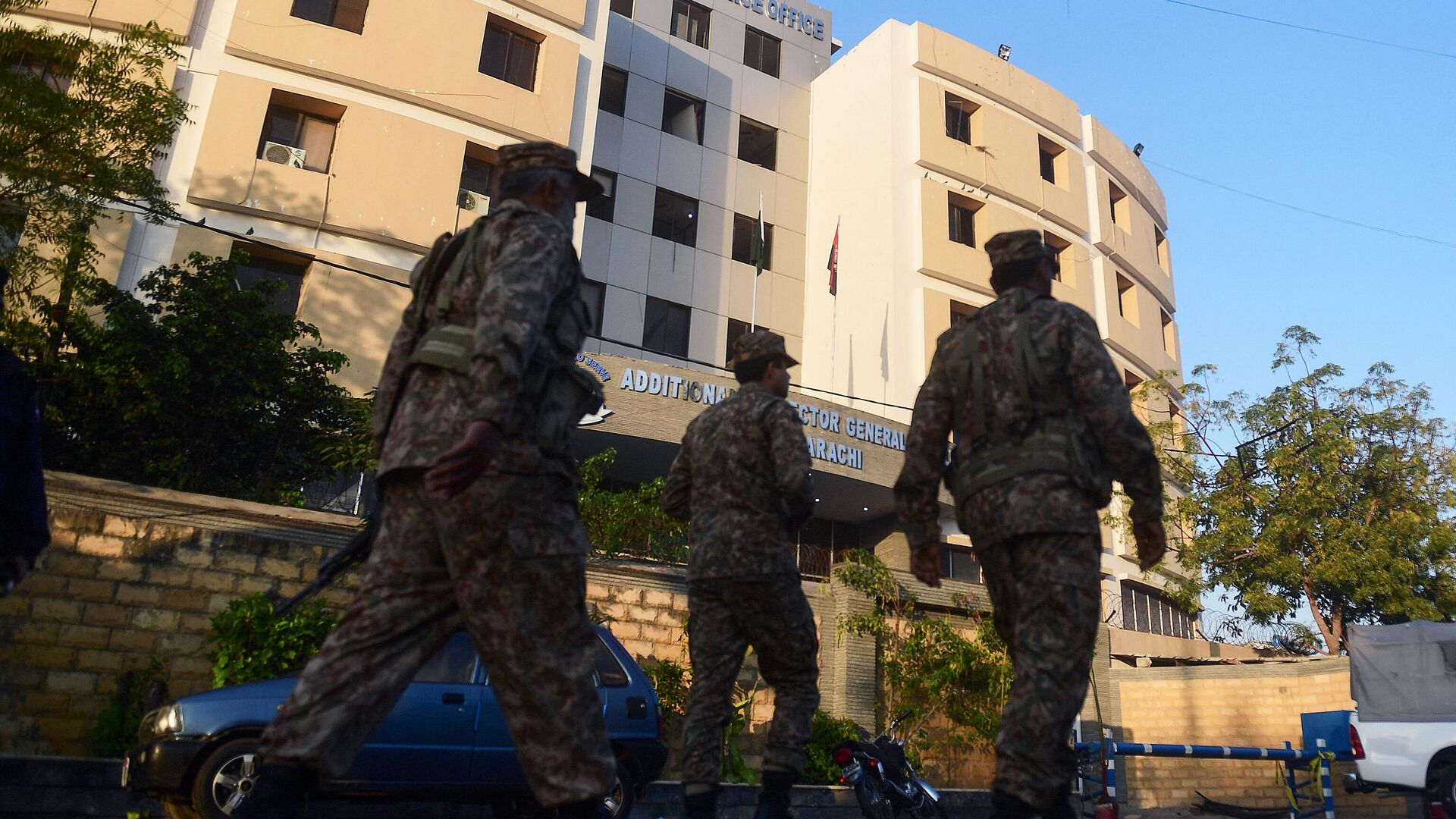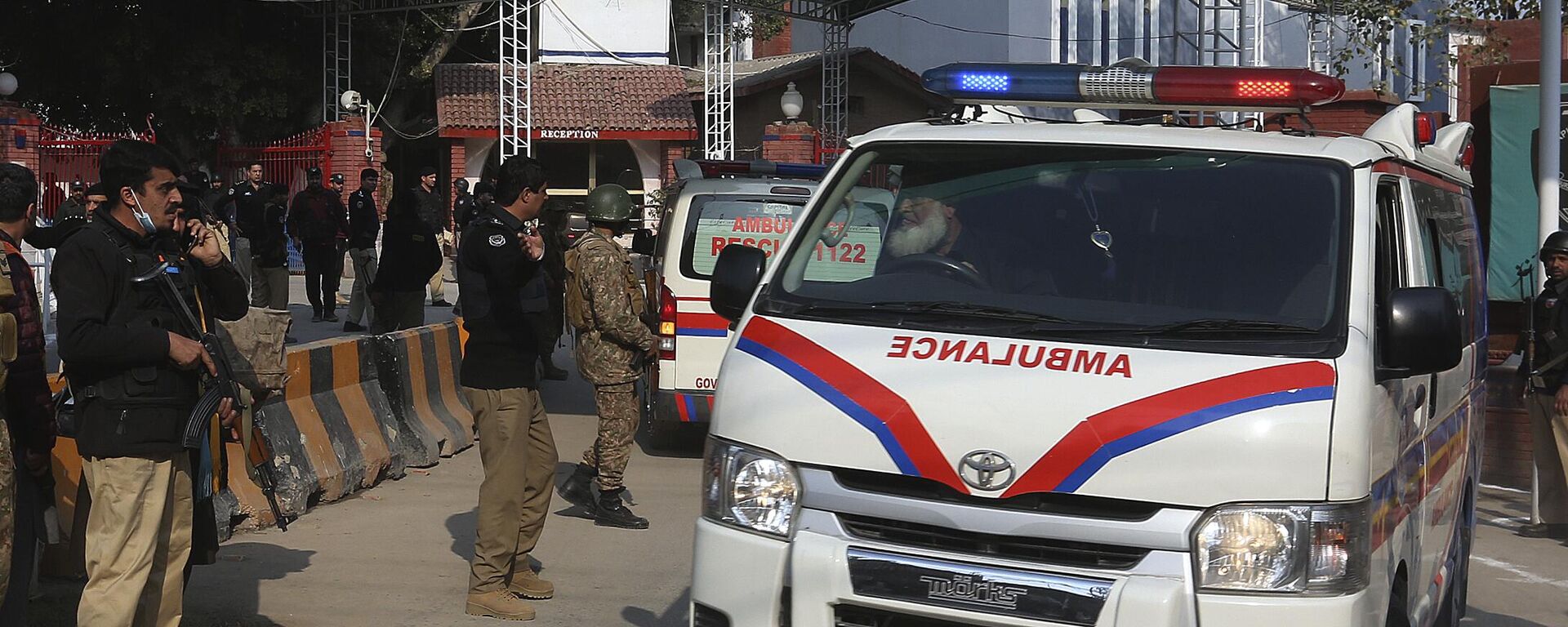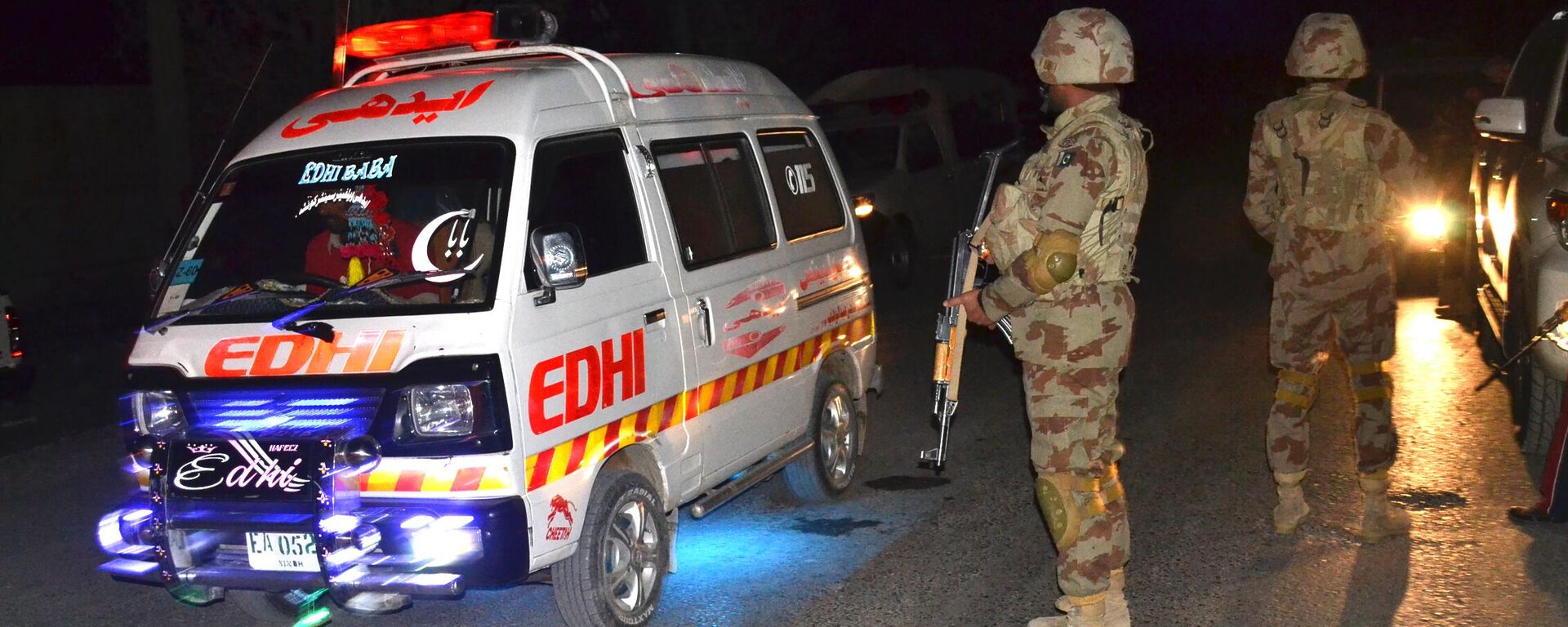https://sputniknews.in/20230409/state-of-rebellion-pakistani-army-arrests-high-value-target-in-balochistan-amid-rising-insurgency-1473555.html
State of Rebellion: Pakistani Army Arrests 'High Value Target' in Balochistan Amid Rising Insurgency
State of Rebellion: Pakistani Army Arrests 'High Value Target' in Balochistan Amid Rising Insurgency
Sputnik India
The leader and founder of the banned Baloch National Army (BNA), Gulzar Imam, known under the alias Shambay, was arrested in a high-profile intelligence bust on Friday. What is going on in the Pakistani province of Balochistan?
2023-04-09T00:24+0530
2023-04-09T00:24+0530
2023-04-09T00:29+0530
pakistan
baloch people
balochistan
south asia
special military operation
militants
https://cdn1.img.sputniknews.in/img/07e7/03/16/1268904_0:160:3073:1888_1920x0_80_0_0_85e8b179f0087d0c7bacf8d2769d7020.jpg
Pakistan's Armed Forces describes Gulzar Imam as a "high-value target" with suspected links to hostile intelligence agencies. The military's media wing said that his arrest was carefully planned and meticulously executed. The exact place where the militant was apprehended has not been disclosed, but it was stated that the Baloch National Army carried out multiple violent terrorist attacks in the country, including targeting law enforcement agencies in Panjgur and Noshki.According to the army statement, Shambay was also involved in creating and leading the Baloch Raji Aajoi Sangar (BRAS) - an umbrella group of Baloch nationalists including the Baloch Liberation Army (BLA), the Baloch Liberation Front (BLF), the Baloch Republican Guard and the Baloch Republican Army.Following Shambay's arrest, the military said: "His visits to Afghanistan and India are also on the record, while his linkages with hostile intelligence agencies are being investigated."What is the Baloch National Army?The BNA emerged from the amalgamation of the Baloch Republican Army (BRA) and United Baloch Army (UBA).The group and its affiliates claim to want greater autonomy for the Balochistan region as they regard both Pakistan and China as threats to its sovereignty. They see development in the region under the China-Pakistan Economic Corridor (CPEC) umbrella as exploitation of Balochistan's resources.However, in 2022, Chinese investment in Pakistan rose to $65 billion as Pakistan and China work together on multiple projects, including hydropower plants, highways and roads, railway networks and a sea port. Last year, Gwadar Port in Balochistan became fully operational, which is predicted to bring in billions in revenue for the province and create thousands of jobs for locals.The province's resources could potentially support the population of Balochistan and bring prosperity to the region, but the region has seen a standoff between the country’s army and the Balochi rebel groups for decades.Rebel groups such as BNA and BRAS typically work separately but they have been known to band together to execute attacks.On August 1 last year, a Pakistani military helicopter crashed in southwestern Balochistan, killing six senior officers, including a major general and lieutenant general. The Pakistani military said that the crash occurred due to bad weather. However, the next day, the Baloch Raaji Aajoi Sangar (BRAS), posted a statement claiming they used anti-aircraft weaponry to down the helicopter.In another deadly attack on April 26, 2022, Baloch separatists killed several Chinese nationals in Karachi. A woman named Shari Baloch went to the Confucius Institute at the University of Karachi and killed three Chinese teachers and a Pakistani driver in a suicide bombing. She was the first female Baloch suicide bomber affiliated with the Balochistan Liberation Army.The attack on Chinese nationals received widespread international media coverage and put a damper on China-Pakistan Economic Corridor (CPEC) projects. It also resulted in Pakistan's army taking a harder stance on the militants and increasing security for Chinese nationals involved in construction of the Gwadar Port and related infrastructure.Why is There a Separatist Insurgency in Balochistan?There were many events that led Baloch separatist movements to gain momentum, however, one of the most significant was the 2006 killing of veteran Baloch leader Akbar Khan Bugti during a military operation ordered by then-President Pervez Musharraf. The government accused Bugti of being behind a series of bombings and a rocket attack on Musharraf, but as one journalist suggested, the two leaders did not see eye to eye since the start.Islamabad, however, maintained the narrative that Balochi tribe leaders like Bugti and "greedy sardars" were difficult to negotiate with as they were opposing all development in the province to maintain power. The army bombings of Dera Bugti (residence of Bugti) reportedly resulted in the displacement of thousands of people in the region, according to Internal Displacement Monitoring Centre’s 2006 report. At the time, the newspaper Dawn reported that the operation to capture Bugti went on for three days before it achieved its goal. His killing resulted in massive protests across the entire Balochistan region, from university students to separatist leaders. Backward Province of Mighty PotentialCurrently, Balochistan remains a conflict-ridden territory, as the locals continue to struggle with their uncertain fate. Most of the province is dry with continental extremes of heat and cold. Agriculture is limited by the scarcity of water, power, and inadequate transportation facilities. The majority of the population raise cattle, while some grow wheat and rice, which are the major food crops of the province.Almost all industries are small-scale and include cotton and woolen manufacturing, food processing, carpet making and textile manufacturing. The transportation network in Balochistan is poorly developed, but roads connect the major towns, and the provincial capital Quetta is connected by road to the port megapolis of Karachi.Over 50% of population in Balochistan is poor and has no way out of their poverty because there are only a few functioning universities and the employment market is very limited. With little options and life choices the Baloch youth become nationalists and join ranks of armies such as the BNA to fight for Balochistan’s autonomy.One Balochi youth named Maqbool revealed in an interview with foreign media that he feels that Pakistan's government has neglected his province. He said that they were being treated like slaves, rather than citizens. In his opinion, the “Punjabi army, media and Punjabi judiciary” neglect pleas of Balochi people. However, some reports explain how the situation in southern Balochistan has improved, especially after an agreement was reached between the Balochistan chief minister and Maulana Hidayat-ur-Rehman, leader of Gwadar’s Haq do Tehreek (HDT) party. The attitude of security forces at checkpoints has improved and the number of posts has been reduced. There was a gradual reopening of border trade with Iran which means increased income for people living near the border areas. Meanwhile, the ongoing CPEC projects aim to focus on improving the quality of life for people living in the Gwadar region. These projects include changing water supply pipelines, coal power to address energy needs, and technical education institutions across the region as well as an industrial estate in Turbat.Balochistan is known to be one of the richest provinces not just in Pakistan, but in the whole of South Asia. Over $1 trillion worth of natural resources have been discovered in the province including gold, copper, black pearl, oil, precious stones, coal, chromite and natural gas.Additionally, Balochistan has a huge sea coastline that stretches for miles along with one of the world's most important shipping routes i.e. the Strait of Hormuz.The Reko Diq gold mine is just one example of the province's immense wealth. Reko Diq, which means 'sandy peak' in the Balochi language, is a small town in Chagai district in Balochistan, close to Pakistan’s border with Iran and Afghanistan, famous for its vast gold and copper reserves.The mines are believed to have the world's fifth-largest gold deposit -- various reports estimate their value between $500 billion and $1 trillion.Pakistan's government is teaming up with a top Canadian mining company Barrick Gold to extract the gold and copper reserves. However, the question remains: will this mega excavation project benefit the average Balochi?
https://sputniknews.in/20230226/four-killed-14-injured-in-blast-in-pakistans-balochistan-province-1008109.html
https://sputniknews.in/20230306/pakistan-suicide-bomb-in-balochistan-kills-nine-policemen-1079561.html
pakistan
balochistan
south asia
Sputnik India
feedback.hindi@sputniknews.com
+74956456601
MIA „Rossiya Segodnya“
2023
Aneela Rashid
https://cdn1.img.sputniknews.in/img/07e6/0c/0d/74548_0:0:485:484_100x100_80_0_0_821526e967ae85d041e2d30ee34fa1de.jpg
Aneela Rashid
https://cdn1.img.sputniknews.in/img/07e6/0c/0d/74548_0:0:485:484_100x100_80_0_0_821526e967ae85d041e2d30ee34fa1de.jpg
News
en_IN
Sputnik India
feedback.hindi@sputniknews.com
+74956456601
MIA „Rossiya Segodnya“
Sputnik India
feedback.hindi@sputniknews.com
+74956456601
MIA „Rossiya Segodnya“
Aneela Rashid
https://cdn1.img.sputniknews.in/img/07e6/0c/0d/74548_0:0:485:484_100x100_80_0_0_821526e967ae85d041e2d30ee34fa1de.jpg
pakistan, baloch people, balochistan, south asia, special military operation, militants
pakistan, baloch people, balochistan, south asia, special military operation, militants
State of Rebellion: Pakistani Army Arrests 'High Value Target' in Balochistan Amid Rising Insurgency
00:24 09.04.2023 (Updated: 00:29 09.04.2023) The leader and founder of the banned Baloch National Army (BNA), Gulzar Imam, known under the alias Shambay, was arrested in a high-profile intelligence bust on Friday. What is going on in the Pakistani province of Balochistan?
Pakistan's Armed Forces describes Gulzar Imam as a "high-value target" with suspected links to hostile intelligence agencies. The military's media wing said that his arrest was carefully planned and meticulously executed.
The exact place where the militant was apprehended has not been disclosed, but it was stated that the Baloch National Army carried out multiple violent terrorist attacks in the country, including targeting law enforcement agencies in Panjgur and Noshki.
According to the army statement, Shambay was also involved in creating and leading the Baloch Raji Aajoi Sangar (BRAS) - an umbrella group of Baloch nationalists including the Baloch Liberation Army (BLA), the Baloch Liberation Front (BLF), the Baloch Republican Guard and the Baloch Republican Army.
Following Shambay's arrest, the military said: "His visits to Afghanistan and India are also on the record, while his linkages with hostile intelligence agencies are being investigated."
"The arrest of Gulzar Imam is a serious blow to the BNA as well as other militant groups, which have been attempting to destabilize the hard-earned peace in Balochistan," the statement added.
What is the Baloch National Army?
The BNA emerged from the amalgamation of the Baloch Republican Army (BRA) and United Baloch Army (UBA).
The group and its affiliates claim to want greater autonomy for the Balochistan region as they regard both Pakistan and China as threats to its sovereignty. They see development in the region under the China-Pakistan Economic Corridor (CPEC) umbrella as exploitation of Balochistan's resources.
However, in 2022, Chinese investment in Pakistan rose to $65 billion as Pakistan and China work together on multiple projects, including hydropower plants, highways and roads, railway networks and a sea port. Last year, Gwadar Port in Balochistan became fully operational, which is predicted to bring in billions in revenue for the province and create thousands of jobs for locals.
The province's resources could potentially support the population of Balochistan and bring prosperity to the region, but the region has seen a standoff between the country’s army and the Balochi rebel groups for decades.
Rebel groups such as BNA and BRAS typically work separately but they have been known to band together to execute attacks.
On August 1 last year, a Pakistani military helicopter crashed in southwestern Balochistan, killing six senior officers, including a major general and lieutenant general. The Pakistani military said that the crash occurred due to bad weather. However, the next day, the Baloch Raaji Aajoi Sangar (BRAS), posted a statement claiming they used anti-aircraft weaponry to down the helicopter.
In another deadly attack on April 26, 2022, Baloch separatists killed several Chinese nationals in Karachi. A woman named Shari Baloch went to the Confucius Institute at the University of Karachi and killed three Chinese teachers and a Pakistani driver in a suicide bombing. She was the first female Baloch suicide bomber affiliated with the Balochistan Liberation Army.
The attack on Chinese nationals received widespread international media coverage and put a damper on China-Pakistan Economic Corridor (CPEC) projects. It also resulted in Pakistan's army taking a harder stance on the militants and increasing security for Chinese nationals involved in construction of the Gwadar Port and related infrastructure.
Why is There a Separatist Insurgency in Balochistan?
There were many events that led Baloch separatist movements to gain momentum, however, one of the most significant was the 2006 killing of veteran Baloch leader Akbar Khan Bugti during a military operation ordered by then-President Pervez Musharraf.
The government accused Bugti of being behind a series of bombings and a rocket attack on Musharraf, but as one journalist
suggested, the two leaders did not see eye to eye since the start.
Journalist and analyst Zahid Hussain saw the conflict between Bugti and Musharraf as a war of egos. "Despite his hardline approach, Bugti was prepared to negotiate. The way I see it, there was ample room for compromise. It did not need to escalate, had Musharraf agreed to resolve the issue through political means."
Islamabad, however, maintained the narrative that Balochi tribe leaders like Bugti and "greedy sardars" were difficult to negotiate with as they were opposing all development in the province to maintain power.
The army bombings of Dera Bugti (residence of Bugti) reportedly resulted in the displacement of thousands of people in the region, according to Internal Displacement Monitoring Centre’s 2006 report. At the time, the newspaper Dawn reported that the operation to capture Bugti went on for three days before it achieved its goal. His killing resulted in massive protests across the entire Balochistan region, from university students to separatist leaders.
Backward Province of Mighty Potential
Currently, Balochistan remains a conflict-ridden territory, as the locals continue to struggle with their uncertain fate. Most of the province is dry with continental extremes of heat and cold. Agriculture is limited by the scarcity of water, power, and inadequate transportation facilities. The majority of the population raise cattle, while some grow wheat and rice, which are the major food crops of the province.
Almost all industries are small-scale and include cotton and woolen manufacturing, food processing, carpet making and textile manufacturing. The transportation network in Balochistan is poorly developed, but roads connect the major towns, and the provincial capital Quetta is connected by road to the port megapolis of Karachi.
Over 50% of population in Balochistan is poor and has no way out of their poverty because there are only a few functioning universities and the employment market is very limited. With little options and life choices the Baloch youth become nationalists and join ranks of armies such as the BNA to fight for Balochistan’s autonomy.
One Balochi youth named Maqbool revealed in an
interview with foreign media that he feels that Pakistan's government has neglected his province. He said that they were being treated like slaves, rather than citizens. In his opinion, the “Punjabi army, media and Punjabi judiciary” neglect pleas of Balochi people.
However, some
reports explain how the situation in southern Balochistan has improved, especially after an agreement was reached between the Balochistan chief minister and Maulana Hidayat-ur-Rehman, leader of Gwadar’s Haq do Tehreek (HDT) party. The attitude of security forces at checkpoints has improved and the number of posts has been reduced. There was a gradual reopening of border trade with Iran which means increased income for people living near the border areas.
Meanwhile, the ongoing CPEC projects aim to focus on improving the quality of life for people living in the Gwadar region. These projects include changing water supply pipelines, coal power to address energy needs, and technical education institutions across the region as well as an industrial estate in Turbat.
Balochistan is known to be one of the richest provinces not just in Pakistan, but in the whole of South Asia. Over $1 trillion worth of natural resources have been discovered in the province including gold, copper, black pearl, oil, precious stones, coal, chromite and natural gas.
Additionally, Balochistan has a huge sea coastline that stretches for miles along with one of the world's most important shipping routes i.e. the Strait of Hormuz.
The
Reko Diq gold mine is just one example of the province's immense wealth. Reko Diq, which means 'sandy peak' in the Balochi language, is a small town in Chagai district in Balochistan, close to Pakistan’s border with Iran and Afghanistan, famous for its vast gold and copper reserves.
The mines are believed to have the world's fifth-largest gold deposit -- various reports estimate their value between $500 billion and $1 trillion.
Pakistan's government is teaming up with a top Canadian mining company Barrick Gold to extract the gold and copper reserves. However, the question remains: will this mega excavation project benefit the average Balochi?




